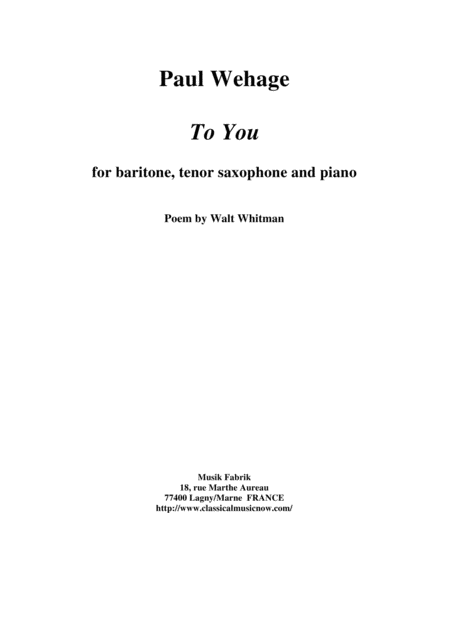Small Ensemble Medium Voice,Piano Accompaniment,Tenor Saxophone - Level 5 - Digital Download SKU: A0.534375 Composed by Paul Wehage. Concert,Contemporary,Holiday,Love,Standards. Score and parts. 41 pages. Musik Fabrik Music Publishing #3396161. Published by Musik Fabrik Music Publishing (A0.534375). To You for Baritone, Tenor Saxophone and piano is dedicated to the American Baritone Kurt Ollmann, who has done much for the promotion and performance of American music both in the United States and abroad.Whitmanâs poem speaks of seeing a stranger and feeling love for this person. In contrast to Poeâs To Helen, which treats a similar subject of a chance meeting of a stranger that the poet loves, Whitman does not idealize his subject but rather pointedly and brutally describes how he sees this person and what feelings (both negative and positive) this contemplation provokes in the poetâs mind In order to reflect this musically, there is an alternation between more introspective and brooding sections which are then followed by more ecstatic outbursts. The piece ends with the poet watching the stranger leave, expressing what the composer felt to be acceptance and release.As in any chamber music with voice, it is important that the two instruments allow the voice to predominate, regardless of the dynamics marked in their parts. The saxophonist should try as much as possible to match colour with the voice,in order to allow the contrapuntal exchanges between the voice and the saxophone to blend evenly. The pianist should play the passages at rehearsal marks E, G and K in a more soloist manner, always taking care not to cover the voice..To YouWhoever you are, I fear you are walking the walks of dreams,I fear these supposed realities are to melt from under your feet and hands,Even now your features, joys, speech, house, trade, manners,troubles, follies, costume, crimes, dissipate away from you,Your true soul and body appear before me.They stand forth out of affairs, out of commerce, shops, work,farms, clothes, the house, buying, selling, eating, drinking,suffering, dying.Whoever you are, now I place my hand upon you, that you be my poem,I whisper with my lips close to your ear.I have loved many women and men, but I love none better than you.O I have been dilatory and dumb,I should have made my way straight to you long ago,I should have blabb'd nothing but you, I should have chanted nothingbut you.I will leave all and come and make the hymns of you,None has understood you, but I understand you,None has done justice to you, you have not done justice to yourself,None but has found you imperfect, I only find no imperfection in you,None but would subordinate you, I only am he who will never consentto subordinate you,I only am he who places over you no master, owner, better, God,beyond what waits intrinsically in yourself.Painters have painted their swarming groups and the centre-figure of all,From the head of the centre-figure spreading a nimbus of gold-color'd light,But I paint myriads of heads, but paint no head without its nimbusof gold-color'd light,From my hand from the brain of every man and woman it streams,effulgently flowing forever.O I could sing such grandeurs and glories about you!You have not known what you are, you have slumber'd upon yourselfall your life,Your eyelids have been the same as closed most of the time,What you have done returns already in mockeries,(Your thrift, knowledge, prayers, if they do not return inmockeries, what is their return?)The mockeries are not you,Underneath them and within them I see you lurk,I pursue you where none else has pursued you,Silence, the desk, the flippant expression, the night, theaccustom'd routine, if these conceal you from others or fromyourself, they do not conceal you from me,The shaved face, the unsteady eye, the impure complexion, if thesebalk others they do not balk me,The pert apparel, the deform'd attitude, drunkenness, greed,premature death, all these I part aside.There is no endowment in man or woman that is not tallied in you,There is no virtue,.
